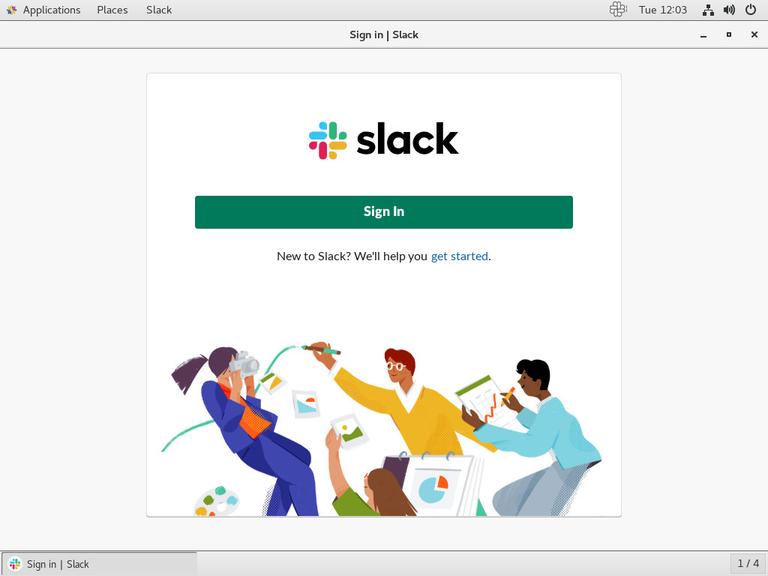
- VAGRANT INSTALL SLACK INSTALL
- VAGRANT INSTALL SLACK FULL
- VAGRANT INSTALL SLACK CODE
- VAGRANT INSTALL SLACK PLUS
- VAGRANT INSTALL SLACK FREE
Vagrant makes it easy to use virtual machines as development environments. Running a dev environment inside a container - spent some time playing with this option, but IMO containers are too ephemeral to suit the use case well.
VAGRANT INSTALL SLACK PLUS
Python's venv - same as above plus a Python version manager would be needed haven't even tried searching for it. rvm, nvm, gvm, etc - a fine option to manage multiple versions of the same language on one machine, but requires careful use. VAGRANT INSTALL SLACK INSTALL
homebrew - it takes forever to install something with it nowadays. Things I tried but abandoned in favor of the Docker + Vagrant approach: But recent Docker's promise to double down on the Development Experience gave me some extra hope for the bright future of this project. At some point in time, I started thinking of replacing Docker with Podman. Quickly hack multi-container playgrounds with docker-compose.ĭocker provides fairly good isolation (assuming I trust the things I run), and it's easy to get rid of things I don't need anymore - just delete not-needed containers and images. Experiment with different versions of the programming languages without setting up a full-fledged dev env. Run arbitrary tools without installing them (e.g., alias jq='docker run -i stedolan/jq'). Having Docker on the host operating systems allows me to: But I still have Docker installed on my macOS. By this time, it's probably clear that the key component here is Vagrant. I deliberately keep this list short because of the reasons mentioned above. VAGRANT INSTALL SLACK CODE
code editors (Vim, Sublime Text, Visual Studio Code, etc.).
 Use arkade for spinning up Kubernetes clusters in no timeīesides everyday things like a browser or a video player, I need only the following tools installed on the host operating system:. Use Vagrant for reproducible and isolated dev environments.
Use arkade for spinning up Kubernetes clusters in no timeīesides everyday things like a browser or a video player, I need only the following tools installed on the host operating system:. Use Vagrant for reproducible and isolated dev environments.  hacking playgrounds with docker-compose. toying with different programming languages. Robusta identifies alerting patterns, enriches alerts with contextual data, and helps you get rid of false positives.
hacking playgrounds with docker-compose. toying with different programming languages. Robusta identifies alerting patterns, enriches alerts with contextual data, and helps you get rid of false positives. 
VAGRANT INSTALL SLACK FULL
Slack is full of Prometheus alerts? Try Robusta - an open-source platform that makes Kubernetes troubleshooting faster.
to work on server-side and full-stack projects. The approach may be helpful for folks using macOS or Linux: I figured a way to achieve that by using only a few tools installed on my host operating system, and I'm going to share it here. And every environment should be project-tailored, easy to spin up, suspend, and, eventually, dispose. Since I usually work on several projects at the same time, I need not one but many isolated development environments. Coming up with the full list of things to reinstall in the case of a sudden machine loss would be hardly feasible. Decreasing time to recover in case of machine loss - a single multi-purpose machine quickly becomes a snowflake host. Projects and domains change often, and installing all the required stuff right into the host operating system would make it messy real quick.  Keeping the host operating system clean and slim - even if I work on something platform-agnostic like a command-line tool, I prefer not to pollute my workstation with the dev tools and packages anyway. So, I'd need to duplicate the development tools from my macOS on every Linux OS I happen to use. Since I use a MacBook, I spend a lot of time inside virtual machines running the same operating system as my servers do. Testing code on the target platform - most of my projects have something to do with server-side and infra stuff hence the actual target platform is Linux. So, now I always try to have an isolated environment per project. Developing multiple projects on the same machine makes it harder to track what libraries and packages are required for what project. Increasing reproducibility of my code - it often happened to me in the past that some code worked on my machine but didn't work on others usually, it was due to missing dependencies. This strategy has the following benefits:
Keeping the host operating system clean and slim - even if I work on something platform-agnostic like a command-line tool, I prefer not to pollute my workstation with the dev tools and packages anyway. So, I'd need to duplicate the development tools from my macOS on every Linux OS I happen to use. Since I use a MacBook, I spend a lot of time inside virtual machines running the same operating system as my servers do. Testing code on the target platform - most of my projects have something to do with server-side and infra stuff hence the actual target platform is Linux. So, now I always try to have an isolated environment per project. Developing multiple projects on the same machine makes it harder to track what libraries and packages are required for what project. Increasing reproducibility of my code - it often happened to me in the past that some code worked on my machine but didn't work on others usually, it was due to missing dependencies. This strategy has the following benefits: VAGRANT INSTALL SLACK FREE
But I prefer keeping my host operating system free of development stuff. I use a (rather oldish) MacBook for my day-to-day development tasks.








 0 kommentar(er)
0 kommentar(er)
